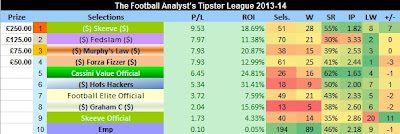An excellent read from Punters' Verdict on the fallacy that the bookmaker is there for you, and a friend in need. The opening salvo is included below, but click on the link for the full piece:
Your friend, the bookmaker….
Bookmakers love to peddle the ridiculous notion that they are your good-hearted friends.
They work tirelessly to give the impression that they are firmly on your side – going out of their way to offer you the best odds, the sweetest deals, the latest cool technology, the biggest sign-up bonuses, the most markets, the broadest range of bets and the biggest and best range of options enabling you to get your bet on.
The wide-boy ‘geezer’ types employed to front the bookmaker’s television ads, combined with a fashionably ‘wacky’ approach to product promotion, might give you the impression that winning is a simple derivative of opening an account with the friendliest and funniest bookmaker.
Newspapers, TV output and radio shows aimed at the sports-betting enthusiast are literally over-run with friendly ‘betting experts’ – all giving the punter the benefit of their wisdom and experience seemingly free of charge. The fact that a good proportion of these ‘experts’ are on the bookmaker’s payroll is never questioned.
Do these people – the bookie’s fork-tongued PR men – really want you to win? Isn’t there a conflict of interest at work here? When some talking head – who takes the bookmaker’s coin for his daily bread – spouts on about good bets on Talksport or Racing UK – can he really serve two masters? Is he really going to be giving you advice that he believes will see his employer lose money on the market?
Of course he isn’t. So what use is his expertise or his advice? No use whatsoever. The whole thing is a sham. Broadcasters and publishers that persist with using the bookmaker’s employees to provide betting ‘expertise’ are doing their readers and viewers a huge disservice. If they really want to serve the punter then why not get some bona-fide pro-gamblers to give their view? How about giving us the opportunity to hear from experts who aren’t invested in the ultimate success of the bookie? How would that be?
But I digress. The purpose of this week’s column is simply to remind you that the bookmaker is NOT your friend. He is your adversary…. your opponent…. your enemy…. and you should never forget it. Don’t get dazzled by his stardust. Don’t get confused by his mixed messages. Don’t get taken in by his PR guff. The bookmaker is NOT your friend.A number of tipsters give selections and the best price available, but often they are from an obscure bookmaker or one with a reputation for closing accounts as soon as the holder shows that they have a clue. As the above article says, "Boylesports, Bet365, BetVictor and others are famous for refusing bets, closing accounts or offering just a fraction of the stake requested", so how many people are really able to place the suggested bets at the likes of these companies? For all its faults, at least Betfair don't (yet) completely ban consistent winners.
There was an amusing comment on a thread on the Betfair Forum from TheVis who offered this advice
Get an account with Victor Chandler
If you can't get them to email you saying your account is closed within a few weeks then you should give up the game.































